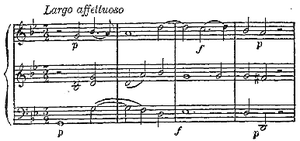
But one ought to know especially the Sixth Concerto in G minor, the most celebrated of all on account of its magnificent Musette. It opens with a beautiful Larghetto, full of that melancholy which is one of the dominant sentiments with Handel, and one of the least observed by most people: melancholy that is, in the sense of the Malinconia of Dürer, or of Beethoven—less agitated, but still profound. We have already encountered it in the Second, in the Third, and in the Fourth Concerto.[1] Here it is found in an elegiac monologue, punctuated by pedal points;

- ↑ The Fifth Concerto in D major may be styled the Concerto to St. Cecilia; for three out of the six movements (the two first and the beautiful final minuet) are found again in the Overture to the little Ode to St. Cecilia.
turesque Polonaise on a pedal-bass, and its final allegro ma non troppo of which the rhythm and unexpected modulations make one think of certain dances in the later quartets of Beethoven.

